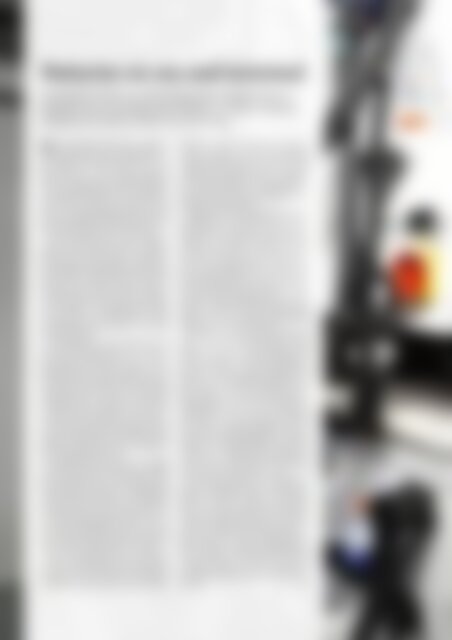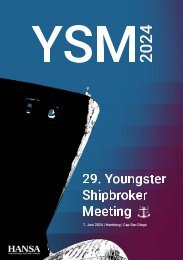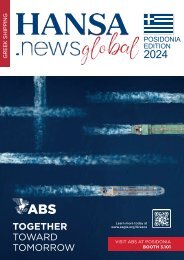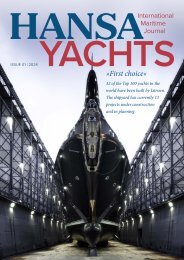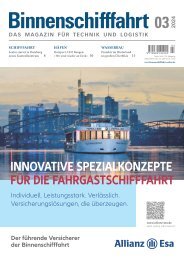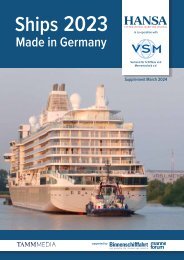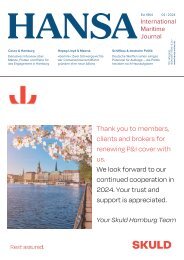HANSA 06-2019
Reparatur & Umbau | Start-Ups | COMPIT Review | CIMAC 2019 | Terminaltechnik | Batterien & Hybrid | Offshore-Flotte | U.A.E. | Cruise Ship Interiors | Zeaborn & Offen
Reparatur & Umbau | Start-Ups | COMPIT Review | CIMAC 2019 | Terminaltechnik | Batterien & Hybrid | Offshore-Flotte | U.A.E. | Cruise Ship Interiors | Zeaborn & Offen
Erfolgreiche ePaper selbst erstellen
Machen Sie aus Ihren PDF Publikationen ein blätterbares Flipbook mit unserer einzigartigen Google optimierten e-Paper Software.
Schiffstechnik | Ship Technology<br />
Batteries on sea and terminal<br />
The push for cleaner air and energy opens opportunities in<br />
segments like cruise ships and workboats as well as terminal<br />
equipment for battery maker Corvus Energy<br />
© Selzer<br />
The unused potential for battery applications<br />
on board cruise and passenger ferries<br />
is huge, says. Roger Rosvold, Vice President<br />
Sales at Corvus Energy. »Batteries<br />
reduce fuel consumption and maintenance<br />
costs, cut pollution and, with increasing environmental<br />
regulations and requirements<br />
that will incur costs for air emissions, provide<br />
a very compelling business case,« he<br />
continues, adding, »The industry is just starting<br />
to understand the power of batteries.«<br />
Corvus Energy has recently signed a<br />
contract with Norwegian Electric Systems<br />
(NES) for the marine world’s largest battery<br />
package to be installed on board Havila<br />
Kystruten’s coastal vessels. Corvus will<br />
deliver an air-cooled ESS with the patented<br />
single-cell thermal isolation, which exceeds<br />
class requirements, to ensure the highest<br />
level of safety. The Energy Storage System<br />
has a capacity per vessel of 6,100 kWh, which<br />
is double the capacity of any existing battery-operated<br />
ferry.<br />
The newbuilds are part of Havila’s contract<br />
with Norwegian Ministry of Transport<br />
for the construction of four environmentally-friendly<br />
vessels to operate on the<br />
Bergen-Kirkenes coastal route from 2021.<br />
Two of the vessels will be built by Turkish<br />
shipbuilder Tersan and the remaining by<br />
Spanish Barreras. At a length of 125 m and<br />
a width of 20 m, the ships will have a hybrid<br />
gas-electric propulsion system with battery,<br />
where four gas-powered engines in each<br />
vessel run the generators. The system is also<br />
adapted to the next generation of technology,<br />
using hydrogen fuel cells.<br />
One of Corvus’ latest projects is the supply<br />
of a 550 kWh Energy Storage System (ESS)<br />
for a new all-electric skimmer workboat. The<br />
ESS will allow the boat to be in full working<br />
mode for four to five hours, and a full battery<br />
charge will take just two hours. In addition,<br />
the vessel has solar panels on board. The vessel<br />
will be a replacement for the current litter<br />
skimmer boat Pelikan that has picked up<br />
about 1,500 t of trash from the Oslo harbour<br />
water surface within its 30 service years.<br />
The 12 m long aluminum vessel will be<br />
built by Grovfjord Mek. Verksted (GMV),<br />
a shipyard that specializes in aluminum<br />
workboats and previously built the world’s<br />
first fully-electric fish farm boat. The boat<br />
will be powered by two electric propulsion<br />
engines and four electric side thrusters. The<br />
combination of deck equipment, manoeuvrability<br />
and energy storage will make this<br />
zero-emission skimmer workboat more efficient<br />
than the previous one. Delivery is expected<br />
in December <strong>2019</strong>.<br />
Roger Rosvold, Vice President Sales at Corvus<br />
Energy is clear in his predictions: »Electrifying<br />
workboats in harbours has only just<br />
begun. For example, the Navtek ZeeTUG zero-emissions<br />
all-electric tug will take to the<br />
water this spring to operate in Istanbul harbour.<br />
We are confident that we will see a massive<br />
shift from diesel to battery on all kinds of<br />
harbour-going vessels due to substantial benefits.<br />
Battery power reduces emissions, which<br />
are increasingly regulated in many ports and<br />
harbours. Moreover, batteries are safer and<br />
quieter for the crew, and save both fuel and<br />
maintenance costs for the owners.«<br />
The battery use does not stop at the quay<br />
wall – and not in Northern Europe – but<br />
continues on shore at the terminal where<br />
Corvus is going to supply the energy storage<br />
system (ESS) for battery-hybrid RTG<br />
cranes by CCCC Shanghai Equipment Engineering<br />
(CCCCSEE). The order is for various<br />
retrofit and newbuild deliveries by its<br />
affiliate ZPMC in Chinese ports. Unlike conventional<br />
diesel electric port cranes, the hybrid<br />
version is powered primarily from the<br />
Corvus battery package resulting in fuel savings<br />
of up to 65%, according to the Canadian<br />
company. The added benefits of reduced operating<br />
costs, reduced greenhouse gas emissions<br />
and lower noise levels at the terminal<br />
make a very attractive business case.<br />
The Orca Energy ESS stores regenerative<br />
braking energy captured as the RTG crane<br />
lowers a container – a high-current charge<br />
that most battery systems cannot sustain.<br />
The stored energy is used to power the RTG<br />
crane during operations such as trolley and<br />
gantry movement, allowing the diesel engine<br />
to be shut off when it would traditionally<br />
be idling or operating inefficiently at<br />
low loads. The size of the generator can be<br />
smaller, the generator can be used less often<br />
and its operation optimized for fuel efficiency.ED<br />
<strong>HANSA</strong> International Maritime Journal <strong>06</strong> | <strong>2019</strong><br />
39


